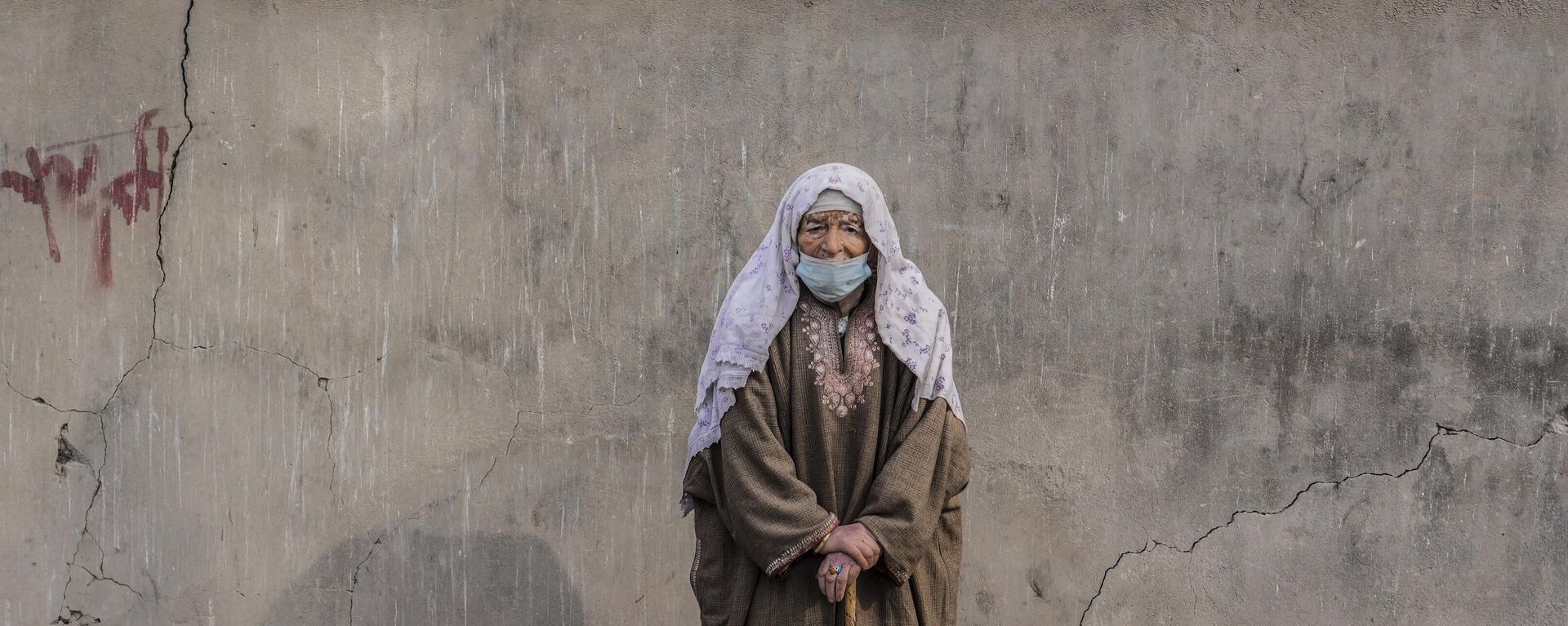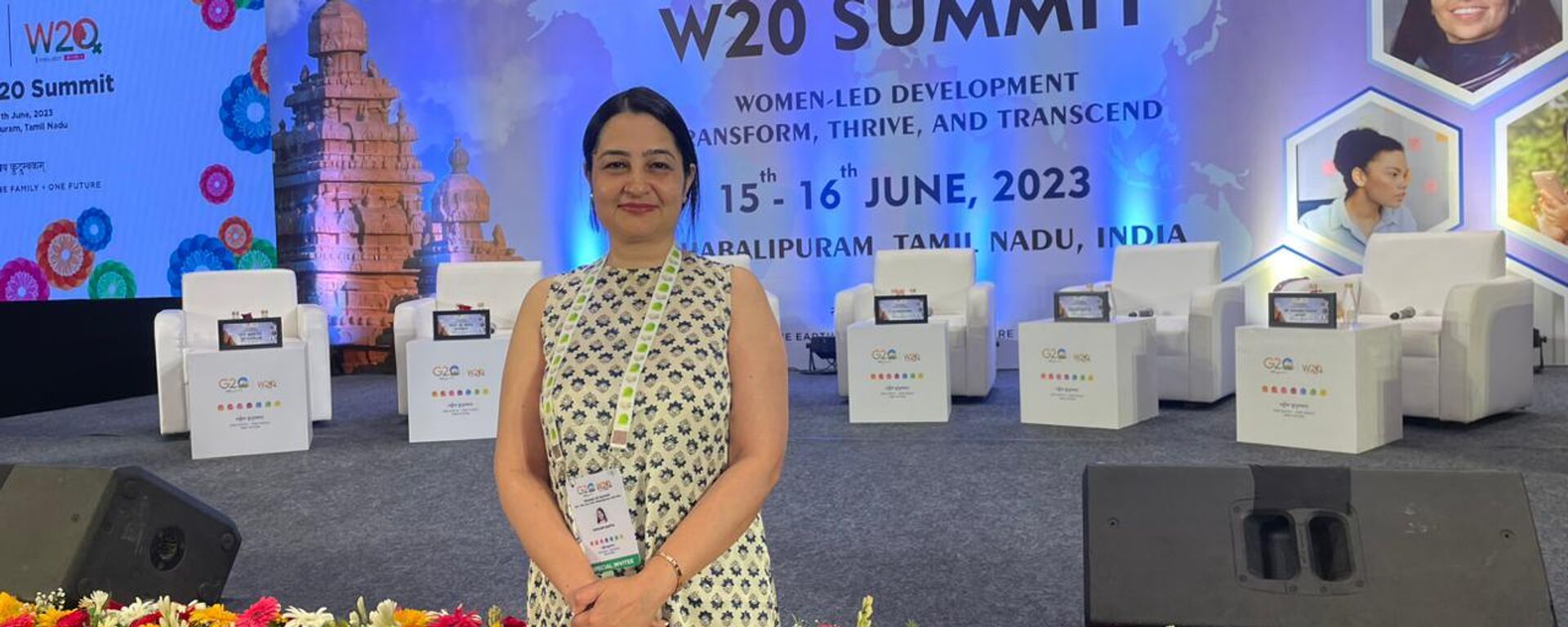https://sputniknews.in/20230620/russias-w-20-sherpa-explains-why-brics-fuses-with-womens-way-forward-2556861.html
Russia's W-20 Sherpa Explains Why BRICS Fuses With Women’s Way ‘Forward’
Russia's W-20 Sherpa Explains Why BRICS Fuses With Women’s Way ‘Forward’
Sputnik India
Sputniknews.in, in an exclusive interview with Russia's W20 Sherpa, Victoria Panova, Vice Rector at High School of Economics University, spoke on a wide range of issues, including the aim of Women 20 and its conclusion.
2023-06-20T14:22+0530
2023-06-20T14:22+0530
2023-06-20T14:44+0530
india
russia
g-20
sputnik exclusives
women empowerment
women's rights
women's education
violence against women
digital inequality
rural india
https://cdn1.img.sputniknews.in/img/07e7/06/14/2577230_0:0:3083:1734_1920x0_80_0_0_83301e4f4ad8b51af7d47474af03ea3a.jpg
Russia's W20 Sherpa Victoria Panova, the Vice Rector at HSE University, spoke to Sputnik in an exclusive interview on a wide range of issues, including the aim of Women 20 -- the official engagement group under the G20 -- and its conclusion.Sputnik: In your opinion, what were the important issues raised in W20? How would you assess the results of W20 work as of now? Panova: The Women-20 was launched in 2015 by the Turkish presidency and supported by the Russian Federation’s Sherpa Svetlana Lukash.Meanwhile, each year when any country hosts G20, the country has its own goal. But all of the goals are connected with each other -- most of the time the issues are related to women's rights and the empowerment of women and how they can benefit from the ongoing cooperation.However, all these initiatives need to be in continuity. Because if we are only discussing new initiatives every year and then forget about them next year, it will be a futile effort. We need to follow up and monitor the commitments that were made.We discussed the issue of entrepreneurship, financial inclusion, family, and work-life balance.We discussed the issues of rural women and women with disabilities, digital divides, and digital inequality that we still have to upskill the workforce in the labor market. Education remains the core of the issue.We have discussed various issues for the past six months and made a consensual document, the Women 20 communique. The document is released after a discussion with all the delegate members, which also corresponds to the Indian motto of G-20, One Earth-One Family.Sputnik: What role does the W-20 forum play in connecting women of the major developed and emerging economies? Why is that important on an international level?Panova: We've been discussing the issues in detail -- impact and best practices towards the issues. Of course, these issues are relevant to women across the world. This is what we're trying to share via our communique, and lots of issues from that will be included in the G-20 document. At the same time, one needs to understand that half of the world's population doesn't mean we're against the other half of the population, which are men. We are working together with men, we are working to put forward the equality of opportunities.Sputnik: How does this forum help foster space for women's rights and commitments in the official G20 process?Panova: Well, the W-20 process does not go against the government. The idea is to have a constructive dialogue with the government, and we raise our concerns. And then, of course, there is a negotiation process. Our conclusions are based on expert recommendations and best practices adopted.And this is extremely important, that we continue this dialogue and keep this going forward.Sputnik: Could you please share some details about the W20 communique?Panova: The current communique has five priority areas with which we are dealing -- climate change, entrepreneurship, the gender digital divide, grassroots leadership and education, skill development, and labor market participation.We also ensured that we're also talking about our previous commitments.We intended to keep it short so that when leaders read it and to know what we're talking about. For the next two months, we will be working on a plan of action that will have a detailed way forward for each of the priority areas enlisted in the communique.Sputnik: How do you see the role of women's leadership in the current geopolitical scenario?Panova: In general terms, women are mothers. Women look at the world to make it safer and stable to ensure that we look at humanitarian cooperation, mutual respect, diplomacy, and soft power.Likewise, BRICS adheres to the women's way because it goes forward with mutual respect, listening to others, and being constructive.Sputnik: How do you see India and Russia's relationship in W20, and how can the two countries work together to enhance it?Panova: Well, India and Russia have had a very special relationship for ages. Earlier, it was the Soviets and Russia; now, it is India and Russia, and both countries are working together to solve many problems.And we're trying to see each other be it in the economy or humanitarian cooperation.Indian student numbers coming to Russia are increasing every year, and not just that, we have military cooperation, energy exchange programmes, technology and space exchange programmes, agricultural products exchange, and many others.So, I see we have a much bigger potential. But we have to work on that because we supplement each other well, and there is a perfect synergy between the two states.
https://sputniknews.in/20230615/eternal-caregivers-elderly-women-in-india-feel-invisible-because-of-social-conditioning-2489570.html
https://sputniknews.in/20230617/companies-should-be-ranked-on-how-many-women-they-employ-says-female-shipping-boss-2526152.html
india
russia
rural india
Sputnik India
feedback.hindi@sputniknews.com
+74956456601
MIA „Rossiya Segodnya“
2023
Deexa Khanduri
https://cdn1.img.sputniknews.in/img/07e6/0c/13/138923_52:0:533:481_100x100_80_0_0_cadf23d341691fc65ff2b22fd1afe584.jpg
Deexa Khanduri
https://cdn1.img.sputniknews.in/img/07e6/0c/13/138923_52:0:533:481_100x100_80_0_0_cadf23d341691fc65ff2b22fd1afe584.jpg
News
en_IN
Sputnik India
feedback.hindi@sputniknews.com
+74956456601
MIA „Rossiya Segodnya“
Sputnik India
feedback.hindi@sputniknews.com
+74956456601
MIA „Rossiya Segodnya“
Deexa Khanduri
https://cdn1.img.sputniknews.in/img/07e6/0c/13/138923_52:0:533:481_100x100_80_0_0_cadf23d341691fc65ff2b22fd1afe584.jpg
russia's w-20 sherpa, women-20, mahabalipuram, women-led development - transform, thrive and transcend, sherpa victoria panova, victoria panova, sputnik news, svetlana lucas, women empowerment, entrepreneurship, financial inclusion, family, work-life balance, rural women, women with disabilities, digital divides, digital inequality, labour market, women 20 communique, one earth-one family, sex-segregated data, equality of opportunities, climate change, entrepreneurship, gender digital divide, grassroots leadership and education, skill development,
russia's w-20 sherpa, women-20, mahabalipuram, women-led development - transform, thrive and transcend, sherpa victoria panova, victoria panova, sputnik news, svetlana lucas, women empowerment, entrepreneurship, financial inclusion, family, work-life balance, rural women, women with disabilities, digital divides, digital inequality, labour market, women 20 communique, one earth-one family, sex-segregated data, equality of opportunities, climate change, entrepreneurship, gender digital divide, grassroots leadership and education, skill development,
Russia's W-20 Sherpa Explains Why BRICS Fuses With Women’s Way ‘Forward’
14:22 20.06.2023 (Updated: 14:44 20.06.2023) Deexa Khanduri
Sputnik correspondent
Last week, India successfully hoisted third and last Women-20, as part of its presidency of the G20, in Tamil Nadu's Mahabalipuram, the theme of two-day event was ‘Women-Led Development - Transform, Thrive and Transcend’.
Russia's W20 Sherpa Victoria Panova, the Vice Rector at HSE University, spoke to Sputnik in an exclusive interview on a wide range of issues, including the aim of Women 20 -- the official engagement group under the G20 -- and its conclusion.
Sputnik: In your opinion, what were the important issues raised in W20? How would you assess the results of W20 work as of now?
Panova: The Women-20 was launched in 2015 by the Turkish presidency and supported by the Russian Federation’s Sherpa Svetlana Lukash.
Meanwhile, each year when any country hosts G20, the country has its own goal. But all of the goals are connected with each other -- most of the time the issues are related to
women's rights and the
empowerment of women and how they can benefit from the ongoing cooperation.
However, all these initiatives need to be in continuity. Because if we are only discussing new initiatives every year and then forget about them next year, it will be a futile effort. We need to follow up and monitor the commitments that were made.
We discussed the issue of entrepreneurship, financial inclusion, family, and work-life balance.
We discussed the issues of rural women and women with disabilities, digital divides, and digital inequality that we still have to upskill the workforce in the labor market. Education remains the core of the issue.
We have discussed various issues for the past six months and made a consensual document, the Women 20 communique. The document is released after a discussion with all the delegate members, which also corresponds to the Indian motto of G-20,
One Earth-One Family.
Sputnik: What role does the W-20 forum play in connecting women of the major developed and emerging economies? Why is that important on an international level?
Panova: We've been discussing the issues in detail -- impact and best practices towards the issues. Of course, these issues are relevant to women across the world. This is what we're trying to share via our communique, and lots of issues from that will be included in the G-20 document.
We need sex-segregated data for proper discussions and to make better policies that will truly impact women, to make their lives better. We're talking about half of the world's population.
At the same time, one needs to understand that half of the world's population doesn't mean we're against the other half of the population, which are men. We are working together with men, we are working to put forward the equality of opportunities.
Sputnik: How does this forum help foster space for women's rights and commitments in the official G20 process?
Panova: Well, the W-20 process does not go against the government. The idea is to have a constructive dialogue with the government, and we raise our concerns. And then, of course, there is a negotiation process. Our conclusions are based on expert recommendations and best practices adopted.
And this is extremely important, that we continue this dialogue and keep this going forward.
Sputnik: Could you please share some details about the W20 communique?
Panova: The current communique has five priority areas with which we are dealing -- climate change, entrepreneurship, the
gender digital divide, grassroots leadership and education, skill development, and labor market participation.
We also ensured that we're also talking about our previous commitments.
We intended to keep it short so that when leaders read it and to know what we're talking about. For the next two months, we will be working on a plan of action that will have a detailed way forward for each of the priority areas enlisted in the communique.
Sputnik: How do you see the role of women's leadership in the current geopolitical scenario?
Panova: In general terms, women are mothers. Women look at the world to make it safer and stable to ensure that we look at humanitarian cooperation, mutual respect, diplomacy, and soft power.
Likewise,
BRICS adheres to the women's way because it goes forward with mutual respect, listening to others, and being constructive.
I think
women's leadership is structured not by corrosion, but led by attractiveness, as they lead by showing how to respect their partner and their friends, and they work together to achieve a consensual future, which would be better for everybody. So, I think this is the key to women's leadership. Of course, I don't deprive men of similar qualities.
Sputnik: How do you see India and Russia's relationship in W20, and how can the two countries work together to enhance it?
Panova: Well, India and Russia have had a very special relationship for ages. Earlier, it was the Soviets and Russia; now, it is India and Russia, and both countries are working together to solve many problems.
And we're trying to see each other be it in the economy or
humanitarian cooperation.
Indian student numbers coming to Russia are increasing every year, and not just that, we have military cooperation, energy exchange programmes, technology and space exchange programmes, agricultural products exchange, and many others.
So, I see we have a much bigger potential. But we have to work on that because we supplement each other well, and there is a perfect synergy between the two states.




